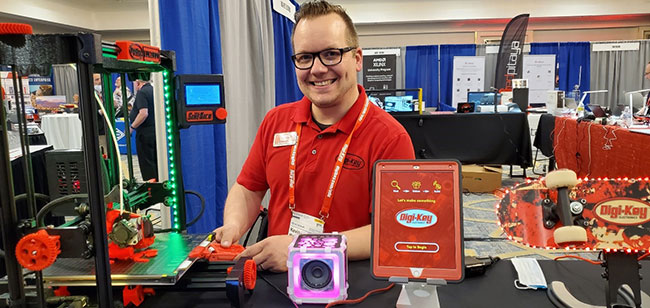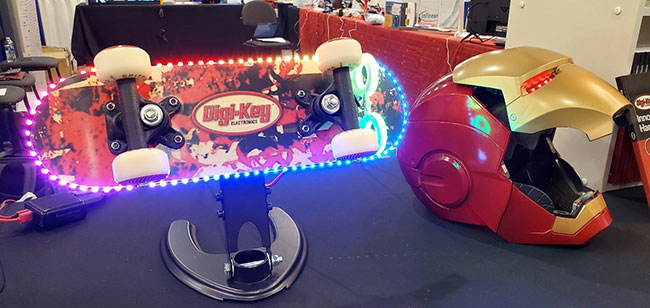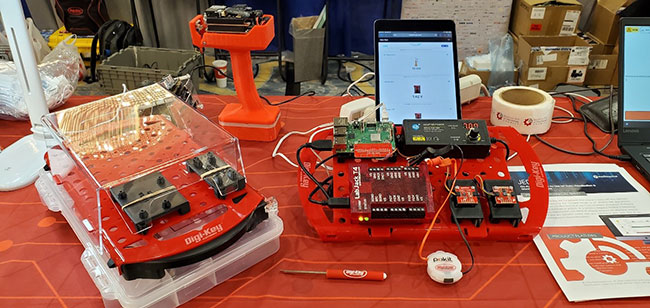DigiKey ECEDHA Annual Conference 2022 Educational Product Highlights
DigiKey is back in the saddle, and we had quite a show at the 2022 ECEDHA Annual Conference ECExpo hosted in New Orleans this year. After nearly two years of virtual events, we were able to meet our academic colleagues and industry partners in person once more. Attendees of the ECExpo were also able to see and (more importantly) interact with new products that have been developed since the last ECEDHA event in Tucson, Arizona. The in-person element cannot be understated. If a picture were a thousand words, then actually being able to hold and manipulate the latest products has been immensely invaluable to the expo attendees. True to the running theme from past ECExpos, DigiKey showcased products helping universities implement student projects to coursework.
 DigiKey’s Kevin Walseth at the DigiKey ECEDHA Annual Conference ECExpo booth
DigiKey’s Kevin Walseth at the DigiKey ECEDHA Annual Conference ECExpo booth
The DigiKey booth stuck to the theme of Maker to Classroom this year. In one corner of our booth we featured the newest Lulzbot 3D printer called the Sidekick (made almost entirely from 3-D printed parts), another area showcased Maker projects (the Iron Man helmet energizes students to innovate), and we even set up a student gaming desk. This desk gave a glimpse of how engineering students could continue their love of gaming while still focusing on their studies. Last, unique products like the Pokit Multimeter are a perfect example of small, obtainable test equipment. It is a fully functioning multimeter not much bigger than a US half-dollar.
 A couple projects showcased at the DigiKey booth
A couple projects showcased at the DigiKey booth
DigiKey’s booth also featured products that facilitate remote hardware access. From the last two years of lockdowns, we recognize that course content creators need hardware that permits remote access. The largest artifact during the event at our booth (and likely among all exhibitor booths) was MikroElektronika’s Planet Debug “frame”. Planet Debug matured greatly from being a remote hardware concept we first showcased in October 2020. Their NECTO Studio is now free to use for academia and also offers dependable access to remote hardware hosted anywhere on this planet. NECTO Studio is MikroElektronika’s IDE of choice for developing with MikroElektronika hardware with libraries for a wide variety of base boards (from the Clicker to the Fusion series), MCU cards (ST Micro to NXP), and the ubiquitous Click boards. The MikroElektronika Click boards are their broadest product offering; an accessory board similar to Arduino shields or Seeed Studio Grove boards, offering complementary capabilities to their base boards from environmental sensors to wireless communication modules. Planet Debug leverages MikroElektronika’s broad Click offering (over 1000 boards as of the publication of this blog post) to give their end-user hundreds of thousands of possible combinations approximating real-life applications as closely as possible. All these hardware combinations can be accessed remotely for the purchase of a $3.99/24-hours license from DigiKey’s Marketplace. This gives educators and students the perfect opportunity to test embedded microcontroller code on combinations of MCU and sensors or accessories for a very low price, 24 hours a day and 7 days a week. Learn more about Planet Debug here.
Also at our booth were a selection of Intel PSG-based Terasic educational boards and various online FPGA course materials they developed with the University of Washington and LabsLand. We will cover this in future blog posts, stay tuned!
Among the most exciting OOTB hardware offerings for academia is the complete Internet Of Things (IoT) joint development kit from Machinechat, LabJack, and JEDI One application running on a Raspberry Pi allows rapid implementation of IoT projects with dashboarding, instant alerts, and rules-based monitoring of sensors deployed on the edge. The Machinechat demo showcases how easy it is to pull together a fully functional IoT system from pre-existing building blocks such as a LabJack DAQ and SparkFun sensors. University researchers and students can quickly test IoT deployment ideas and focus on their end product. There is no need to worry about all the software and hardware components working together. Machinechat takes care of it all for the end-user. For more information on how to quickly build up an IoT system in 30 minutes or less, view this on-demand webinar from DigiKey.
Most of DigiKey’s product demos were mounted on red Phasedock Workbenches. You may have also seen an intriguing contraption with a compartmentalized electronics organizer box attached to it at DigiKey’s booth. Phasedock products are the best-kept secret of the electronics industry and belong in every university electronics lab. Students can build their electronics projects on a portable “tray” (the Phasedock Workbench) that securely holds all the pieces in place via detachable/modular Clicks. The Clicks are footprint compatible with Arduinos, Raspberry-Pis, and Digilent and Terasic FPGA educational boards, allowing students to build entire class projects on the Workbenches and not having to worry about moving components and connecting wires falling out of connectors and breadboards. At the end of the day, students can park their Workbenches back in their lockers or carry them back to their dorm rooms or apartments knowing they can resume later on with their project intact. You can order Phasedock Workbenches in your school color (we did “DigiKey Red”). Attention Lab Managers!
 Projects showcased at the DigiKey booth mounted on Phasedock Workbenches
Projects showcased at the DigiKey booth mounted on Phasedock Workbenches
The ECEDHA ECExpo 2022 in New Orleans was a chance for DigiKey to showcase new products of note from the last two years. We are excited to be once again having in-person meetings with our valued academic customers. DigiKey will be hosting a virtual “Pop-Up” virtual event in the latter half of May with ECEDHA. We will be inviting many of the suppliers mentioned in this article to interact directly with you. Stay tuned for the announcement, and we look forward to your business in 2022 and beyond!

Have questions or comments? Continue the conversation on TechForum, Digi-Key's online community and technical resource.
Visit TechForum









